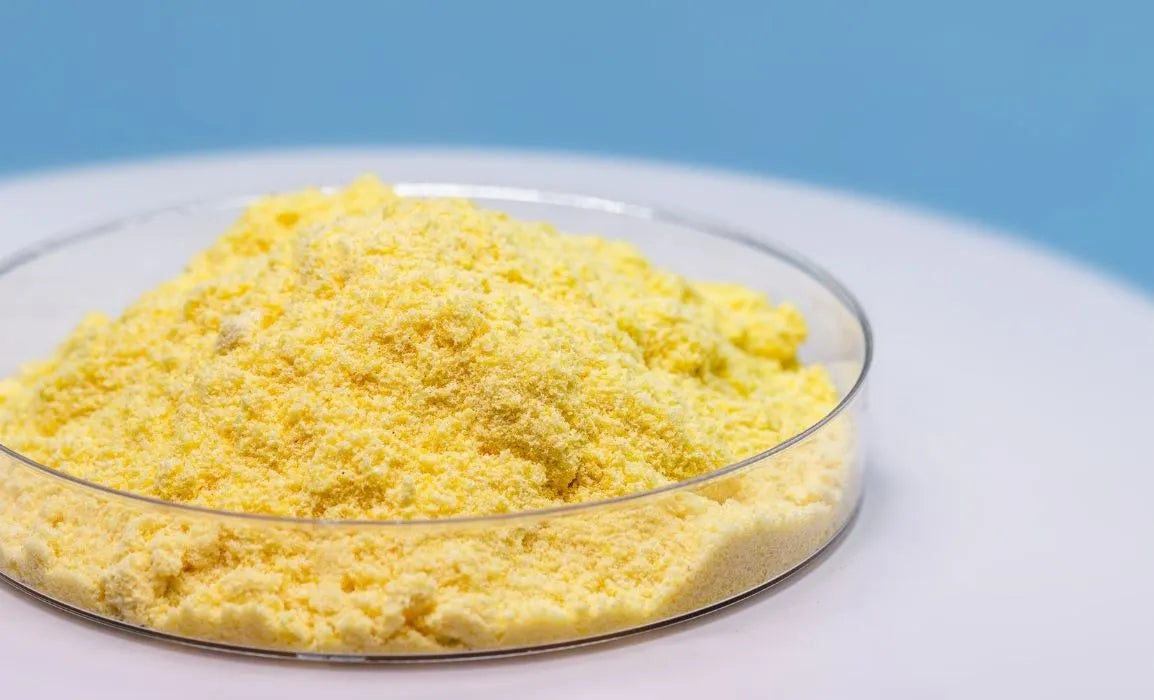Sulphur in Skincare

Introduction
Unlike other active ingredients like retinol and peptides, sulphur has been around longer in the skincare industry. From using it in many dermatologist-approved acne treatments to fleeing its bad smell in high school chemistry labs, sulphur is a well-known ingredient. You might not be aware of the developments the ingredient has brought about in skincare, as well as the several advantages it provides beyond only acne and blemish correction. Here's why you should include sulphur in your skincare and what its benefits and precautions are.
What is sulphur?
Sulphur is an essential, naturally occurring element found in various rocks, minerals, and even human bodies as amino acids and vitamins. In skincare, sulphur is known for having antibacterial properties against acne-causing germs and also encouraging the skin's loosening and shedding.
What does sulphur do in skincare products?
Lots of products have sulphur as a component to help control dandruff, seborrheic dermatitis, and psoriasis while also reducing the degree of acne blemishes, pimples, blackheads, and whiteheads. Sulphur is used in cosmetics and personal care products to enhance the look and feel of hair by adding more body to it, rendering it supple or lustrous or altering the nature of physically or chemically damaged hair. This can also help to improve rough skin appearance and lessen scaling.
Sulphur benefits in skincare
For several skin issues, some qualities of sulphur make it ideal as an acne treatment, such as its anti-inflammatory and antibacterial properties. Below are some ways sulphur benefits your skin:
- Dries out blemishes: Sulphur lowers skin's sebum or oil. When applied to the blemish, sulphur dries out the skin so it may then be sloughed away, making it an important ingredient in our Overnight Acne Spot Corrector.
- Promotes exfoliation: Sulphur exfoliates dead skin and clears toxins. It has a keratolytic effect that helps to clear dead skin cells and avoid blocked pores.
- Fights bacteria: Sulphur kills germs, fungus, and several parasites; thus, it is a dermatologist's preferred treatment for bacterial problems.
- Treats sensitive skin conditions: Sulphur is often used to treat acne, psoriasis, and seborrheic dermatitis or dandruff since it is anti-inflammatory and helps to soften and exfoliate thick, dead skin. It is also reported to help with rosacea and eczema.
Precautions while using sulphur
Although sulphur is regarded as a mild component, some skin types could react to it. Using the ingredient once a day as a face wash will help you include it in your regimen in the best way. The low concentration of sulphur in soap and face washes makes them safe for daily usage. Although these products are safe, they can make your skin dry and rough.
Just so you know, there are sulphur pills available on the market that can be taken orally. But it is better to stick to topical routes, as they have fewer side effects and can be applied directly to your skin. As usual, also see your dermatologist before including new ingredients in your skincare regimen.
Below are some safety precautions you should take to stay on the safe side:
- When consumed orally: There is not enough recorded data to determine whether sulphur is safe or what side effects could result. In some cases, it might lead to diarrhoea.
- When applied to the skin: If applied to the skin, sulphur is probably safe if used sensibly for a short period. Products containing sulphur in concentrations up to 10% have been safely used for up to eight weeks. Some people claim that using sulphur products on their skin dries it because it is not suitable for them.
- Pregnancy and breast-feeding: Sulphur is probably safe, short-term, when used on the skin suitably. Products with sulphur levels up to 6% have been used safely every night for up to six nights. Not enough trustworthy data exists to determine whether sulphur is safe for oral consumption during breast-feeding and pregnancy. Keep on the safe side; do not take it orally.
- When applied to children: Sulphur is probably safe in the short-term when used sensibly on the skin. Products containing sulphur in concentrations up to 6% have been used safely when applied nightly to children and adolescents for up to 6 nights. For infants, products including sulphur in concentrations up to 2% have been used safely for three hours daily for up to six days.
- Sulfa allergy: People who have a sulfa allergy are sometimes believed to be allergic to sulphur-containing products as well as sulfa drugs. This isn't accurate. Those allergic to “sulfa” react to some antibiotics and related medications' sulfonamides. They have no reaction to elemental sulphur.
Conclusion
So now that you know “what is sulphur” and how sulphur benefits your skin, let’s see the final note. Although sulphur is useful for many people, it is crucial to emphasise that it might not be appropriate for everyone. Some people may have skin irritation or sensitivity to sulphur or find products containing sulphur objectionable. Before using a new skincare product with sulphur, make sure it is suitable for your skin by doing a patch test. See a dermatologist if you have questions or worries about including sulphur in your skincare regimen.


























































